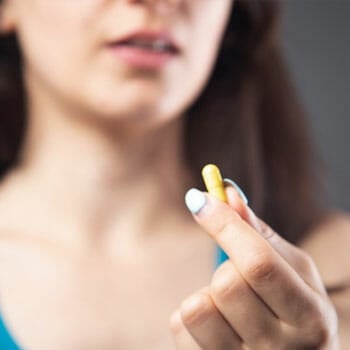Yes. FDA-approved appetite suppressants are safe for weight loss and treatment of obesity. When taken with a doctor's prescription and supervision, it can give your weight loss goals excellent, safe results.
According to studies, an average person eats between three and five pounds of food per day, depending on age, gender, metabolism, and habits.
And if you're like most people who need to eat doughnuts and cakes to feel satiated, losing weight can feel like a tough grind.
Appetite suppressants can work to help you cut your cravings short.
Quick Summary
- FDA-approved appetite suppressants are generally considered safe for weight loss and obesity treatment when taken under medical supervision.
- Appetite suppressants function by targeting the central nervous system to reduce hunger, making them a component of a comprehensive weight loss strategy alongside diet and exercise.
- Research published in PubMed indicates that one-third of patients taking appetite suppressants showed mild to moderate valvular heart disease.
- In my opinion, while appetite suppressants can be effective, they should be used cautiously and always under professional medical guidance.
How Do Appetite Suppressants Work For Weight Loss?

Appetite suppressants work as an anorectic drug or prescription medication [1].
In my medical practice, I've seen appetite suppressants effectively act on the central nervous system's satiety center to reduce hunger.
They also affect the digestive processes involving fat absorption, carbohydrate metabolism, and overall physical activity, according to the Pharmacology and Therapeutics [2].
Appetite suppressants should be viewed as a component of a comprehensive weight loss strategy that includes diet and exercise.
These suppressants aid in weight loss by reducing hunger and curbing cravings, targeting the brain's appetite control center to prolong feelings of fullness and thus help in reducing overall calorie intake.
They help your body to feel full longer and lessen calorie intake from food consumption. But it is not recommended to replace a healthy lifestyle.
How Long Should You Take Appetite Suppressants?

Studies show that visible results were observed within six months of medication.
Based on my experience, patients often observe visible weight loss results within six months of using appetite suppressants, though I generally advise a shorter duration.
Here are some appetite suppressants for up to 12 weeks of use:
- Benzphetamine
- Diethylpropion
- Phendimetrazine
It's best to seek medical counsel about how long to take these medications for personal weight loss or other treatment plans.
What Is The Best and Safest Appetite Suppressant?

Appetite suppressants are popular in the weight loss market, both as prescription and over-the-counter options, offering short-term and long-term hunger control.
Beyond aiding in weight loss, some suppressants may also positively impact high blood pressure, diabetes, and cholesterol.
However, consulting a healthcare professional is crucial to choose the safest and most effective option, especially when considering potential interactions with other medications and existing health conditions.
From my clinical experience, the best and safest appetite suppressant varies per individual, considering their unique medical history and health conditions.
Make sure you check out our list of the top appetite suppressants on the market.
Prescription Appetite Suppressants

Prescription appetite suppressants are doctors' prescribed drugs or diet pills for weight loss. As a doctor, I've prescribed various appetite suppressants for weight loss, tailoring choices to individual patient needs.
It's important to note that the legal aspects of prescribing appetite suppressants vary across different states, indicating a need for awareness about state-specific regulations when considering these medications.
Here's a shortlist of prescription medications:
- Lorcaserin (Belviq) - Belviq works to reduce appetite by acting on the 5-HT2C receptor for serotonin in the brain [3], which regulates feelings of fullness and hunger. It is recommended for people with a Body Mass Index (BMI) of 30 or 27 along with a weight-related condition.
- Phentermine (Adipex-P, Lomaira, and Suprenza) - Phentermine helps lessen food intake and improves energy released by your body. However, its downsides may include fast heart rate, hypertension, sleeplessness, and mental instability, according to the WebMD [4].
- Phentermine-Topiramate (Qsymia) - Qsymia is an extended-release capsule with two drugs, Phentermine which suppresses appetite, and Topiramate, which prevents seizures. It is advised for people with a BMI of over 27 or a weight-related condition to undergo a lifestyle change to lose weight.
- Naltrexone-Bupropion (Contrave) - Contrave is an extended-release capsule and contains two medicines, Naltrexone and Bupropion. Its combination works on the hypothalamus and the brain's reward system to promote satiety to manage excess weight gain, according to the P & T [5]. It is recommended along with a low-calorie diet and workout plan to lose weight.
- Liraglutide (Saxenda) - Saxenda is an injectable drug that lessens hunger by producing an appetite hormone called Glucagon-Like Peptide (GLP-1), which slows stomach emptying. It is advised for people with a BMI of more than 27 along with a weight-related medical condition [6]. According to studies published in NIH, you can continue using these drugs as long as they serve you well and offer no significant side effects [7].
Related Article: First Diet Pills
Over-The-Counter (OTC) Appetite Suppressants

Along with doctors prescribed medications, OTC natural supplements may help control appetite for weight reduction and management.
In my practice, I've noticed that OTC appetite suppressants like Glucomannan and Green Tea Extract can be beneficial, but I always advise patients to consult before starting any supplement.
Here are some OTC drugs and how they work:
- Fenugreek, Glucomannan, Acacia fiber, and Guar Gum lessen hunger by increasing fullness due to high soluble fiber content.
- Yerba Mate, Coffee, Green Tea Extract, and Guarana supplement weight loss by boosting metabolism due to high caffeine content.
- Garcinia Cambogia, Caralluma Fimbriata, and Griffonia simplicifolia are supplements known to control hunger pangs by increasing serotonin levels in the brain.
- Conjugated linoleic acid (CLA), Bitter Orange, Forskolin, and Saffron Extract are known to lower appetite by increasing fat breakdown.
What Are The Potential Side Effects Of Appetite Suppressants?

In my practice, I've noted that while effective, appetite suppressants can pose risks, similar to other medications.
Here are the most commonly experienced side effects:
- Restlessness
- Dizziness
- Sleeplessness
- Dry mouth
- Constipation
- Loose Stools
- Increased Heart Rate
Side effects with appetite suppressants can differ depending upon the type of drug and how it works [8]. However, they can be mild to moderate but are still considered safe when taken under a doctor's supervision.
Who Should Not Take Appetite Suppressants?

- People with Cardiovascular Problems. Research published in PubMed suggests that mild to moderate valvular heart disease showed one-third of the patients taking appetite suppressant drugs [9].
- People with Glaucoma. Appetite suppressants may tend to raise blood pressure that can add more stress to your eyes. It can lead to blurred vision and permanent damage [10].
- People with Liver Disease. Some weight loss supplements may elevate liver enzymes in patients with existing liver damage, resulting in liver failure if not medically supervised, according to the Journal of Clinical and Translational Hepatology [11].
- People with hyperthyroidism. Some OTC appetite suppressants might contain significant thyroid hormone levels that may affect the hormonal responses of patients with overactive thyroid problems [12].
- People who are taking antidepressant drugs. Some appetite suppressants tend to interfere and counter the effect of antidepressant drugs, which can cause serious side effects [13].
Are Natural Alternative Ways Better Than Diet Pills To Lose Weight Safely?

From my observations, natural methods like diet and exercise are effective for weight loss, though they often take longer to show results compared to appetite suppressants.
In addition to pharmaceutical options, natural appetite suppressants like fenugreek and glucomannan offer alternative solutions. These natural compounds have been studied for their effects on satiety and calorie intake, though their efficacy and safety in large doses warrant further investigation.
Here's a list of alternative ways to curb your appetite [14]:
- Eat a reduced-calorie diet and protein-rich foods
- Drink water before every meal
- Exercise before a meal
- Eat high fiber foods
- Eat mindfully and avoid stress
Related Articles:
References:
- https://www.medartsweightloss.com/blog/2017/3/21/how-do-anorectics-suppress-my-appetite-and-help-me-lose-weight
- https://www.sciencedirect.com/topics/pharmacology-toxicology-and-pharmaceutical-science/anorexigenic-agent
- https://www.ncbi.nlm.nih.gov/pmc/articles/PMC3828930/
- https://www.webmd.com/drugs/2/drug-4151/phentermine-oral/details
- https://www.ncbi.nlm.nih.gov/pmc/articles/PMC4771085/
- https://www.webmd.com/drugs/2/drug-153566/liraglutide-subcutaneous/details
- https://www.niddk.nih.gov/health-information/weight-management/prescription-medications-treat-overweightobesity#:~:text=The%20FDA%20has%20approved%20five,not%20having%20unpleasant%20side%2Deffects.
- https://www.drugs.com/article/side-effects-weight-loss-drugs.html
- https://pubmed.ncbi.nlm.nih.gov/12357124/
- https://www.hopkinsmedicine.org/health/conditions-and-diseases/high-blood-pressure-hypertension
- https://www.ncbi.nlm.nih.gov/pmc/articles/PMC4548352/
- https://www.medscape.com/viewarticle/853215
- https://www.news24.com/life/archive/Weight-gain-and-antidepressants-20130210
- https://www.medicalnewstoday.com/articles/324123
About The Author
You May Also Like






